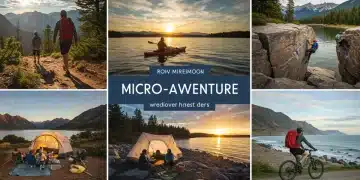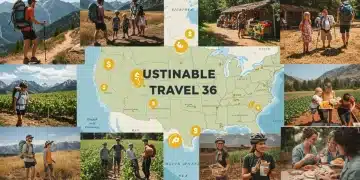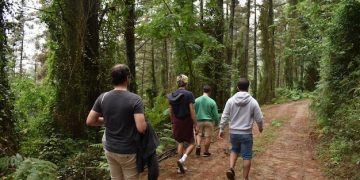Emerging travel trends reshaping American tourism habits

Local experiences are increasingly central to travel, allowing travelers to engage authentically with communities and cultures while supporting sustainable tourism and local economies.
Emerging travel trends reshaping American tourism habits are influencing how we discover and enjoy new destinations. Have you considered how these trends might affect your next adventure? Let’s dive in and explore what’s changing.
The rise of sustainable tourism
The rise of sustainable tourism is changing the way travelers explore the world. As more people become aware of their impact on the environment, they seek experiences that align with their values. This trend focuses on minimizing harm to nature while supporting local communities.
What is Sustainable Tourism?
Sustainable tourism refers to travel practices that promote a positive impact on the environment, economy, and culture of the destinations visited. It encourages visitors to engage with local cultures while preserving natural resources.
Key Principles of Sustainable Tourism
- Protecting natural resources and ecosystems.
- Supporting local economies and businesses.
- Promoting conservation and wildlife protection.
- Encouraging respect for local cultures and traditions.
Travelers are increasingly choosing eco-friendly accommodations, such as hotels that use renewable energy and sustainable practices. Additionally, they participate in activities that leave a light footprint on the environment, like hiking and community-based tourism.
Organizations are also getting involved by creating programs to educate travelers about sustainability. These initiatives often highlight the importance of reducing waste, conserving water, and supporting local artisans. As a result, travelers become more knowledgeable and responsible consumers.
Benefits of Sustainable Tourism
- Enhances visitor experiences by connecting them with locals.
- Protects and preserves natural and cultural resources.
- Strengthens the local economy through sustainable practices.
- Encourages responsible travel behaviors among visitors.
The ripple effect of sustainable tourism is noticeable in communities worldwide. Local businesses thrive, natural habitats are preserved, and cultural heritage is celebrated. By choosing sustainable options, travelers contribute to a brighter future for destinations around the globe.
Impact of technology on travel planning

The impact of technology on travel planning has been transformative in recent years. With just a few taps on a smartphone, travelers can access a wealth of information about destinations, accommodations, and activities. This convenience has changed how we choose and organize our trips.
Online Booking Platforms
One significant advancement is the rise of online booking platforms. These websites simplify the process of finding flights and hotels. Users can compare prices, read reviews, and book everything in one place.
Mobile Apps for Travelers
Mobile apps have also revolutionized travel planning. Apps like Google Maps and TripAdvisor provide real-time information about places to visit and stay. Many apps allow users to create itineraries, making it easy to organize travel plans efficiently.
- Access to up-to-date travel information.
- Customization of travel experiences.
- Easy communication with service providers.
- Ability to read reviews and ratings from other travelers.
Another area where technology shines is in communication. Travelers can easily reach out to hotels and tour operators via email or chat. This direct contact helps in resolving any issues that may arise before or during a trip.
Social media also plays a crucial role in travel planning. Platforms like Instagram and Pinterest serve as sources of inspiration, showcasing beautiful destinations and activities. Users often share their experiences, helping others discover hidden gems. Travelers frequently use hashtags to find relevant information, making it easier to plan unique trips.
Artificial Intelligence in Travel
Artificial Intelligence (AI) is emerging as a significant player in the travel industry. AI-powered chatbots assist travelers with instant responses to inquiries, making the planning process simpler. These tools can recommend destinations based on user preferences, enhancing the experience further.
As technology continues to grow, its influence on travel planning will only increase. By embracing new tools and platforms, travelers can enjoy a more connected and personalized journey.
Shifts in travel preferences after the pandemic
Shifts in travel preferences after the pandemic have reshaped how many people approach their vacations. Travelers are now prioritizing safety, flexibility, and unique experiences over traditional options. The pandemic has led to a reevaluation of what matters most when planning a trip.
Increased Focus on Safety
Health and safety concerns have moved to the forefront of travel planning. Many travelers now prefer destinations that have proven safety protocols in place. This focus has changed the way accommodations and service providers operate, ensuring cleanliness and health measures are visible to guests.
Preference for Nature and Outdoor Activities
There is also a marked shift toward outdoor and nature-based activities. People are seeking destinations that offer space and fresh air, like national parks and scenic coastal areas. This trend encourages travelers to explore local surroundings rather than venturing far from home.
- Growth in domestic travel and staycations.
- Higher demand for road trips over flying.
- Popularity of camping and hiking as travel options.
- Interest in smaller, less crowded destinations.
Flexibility in bookings has become a critical factor. Many travelers are looking for options that allow easy changes or cancellations. This demand for flexibility aligns with the uncertainty that the pandemic has brought, making it essential for travelers to have peace of mind during their planning.
Additionally, people are placing greater value on experiential travel. Instead of merely visiting a location, they want to immerse themselves in the culture and community. This could mean participating in local workshops or learning regional crafts, which helps create memorable experiences.
Technology and Travel Trends
The use of technology for planning has also seen significant growth. Travelers are increasingly using apps and websites to compare options, check ratings, and find local experiences. This trend has empowered travelers with the information needed to make informed decisions.
As a result, the shifts in travel preferences after the pandemic are leading to a more thoughtful approach to exploring new places. These changes reflect a fundamental change in traveler attitudes, prioritizing well-being, safety, and meaningful interactions during their journeys.
Local experiences taking center stage

Local experiences are taking center stage in the travel industry as more visitors seek to connect with the culture and community of their destinations. This trend highlights the desire for authenticity, allowing travelers to immerse themselves in the local way of life.
The Rise of Authentic Travel
As travelers become more conscious of their impact, there is a growing interest in experiences that promote cultural exchange. These activities allow visitors to learn from locals, creating a deeper understanding and appreciation of different traditions and lifestyles.
Types of Local Experiences
Travelers can engage in various local experiences that enrich their journeys. Some popular options include:
- Cooking classes that teach regional recipes.
- Art and craft workshops led by local artisans.
- Guided tours by community members sharing their stories.
- Volunteering with organizations that support local causes.
Participating in these activities not only enhances the travel experience but also supports local economies. When travelers choose to support small businesses and engage with community members, they contribute to sustainable tourism.
Moreover, local experiences can lead to unexpected adventures. For instance, a traveler might discover a hidden gem, such as a small café or a local festival, that is off the beaten path. Such encounters often create lasting memories and unique stories to share.
Impact on Tourism
As more travelers prioritize local experiences, destinations are adapting to cater to this shift. Tour operators and accommodations are offering tailored packages that promote community engagement. This adaptation not only benefits visitors but also fosters a sense of pride among local residents.
In conclusion, local experiences are enriching travel like never before. By immersing themselves in the culture and traditions of a destination, travelers can create meaningful connections and support the communities they visit. This approach not only enhances the travel experience but also plays a significant role in shaping the future of tourism.
In summary, embracing local experiences is revolutionizing the way we travel. By connecting with the culture and community, travelers gain more than just memories; they create meaningful relationships and contribute to the well-being of their destinations. This shift not only enriches their journeys but also supports sustainable tourism. As we move forward, prioritizing authentic experiences will lead to a deeper appreciation of diverse cultures and help sustain the places we love to visit.
FAQ – Frequently Asked Questions about Local Experiences in Travel
What are local experiences in travel?
Local experiences are activities that allow travelers to engage directly with the culture and community of a destination, such as cooking classes, workshops, or guided tours by locals.
Why are local experiences important for travelers?
Local experiences provide authentic interactions, helping travelers to gain deeper insights into the culture and history of a place, making their trips more meaningful.
How can I find local experiences when I travel?
You can find local experiences through travel apps, websites, and local tour operators that specialize in immersive activities and cultural exchanges.
What benefits do local experiences bring to communities?
Local experiences help support small businesses and promote sustainable tourism, which can lead to economic growth and preservation of culture in the community.





